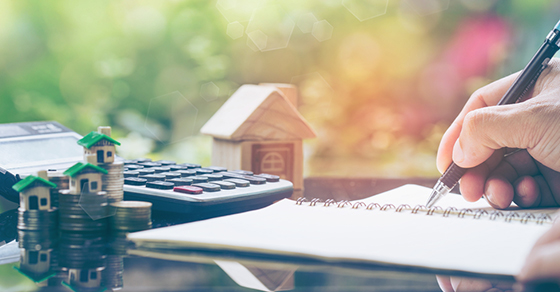
6 Top Mortgage Planning Tips You Need to Know
Tags:
Buying a home is one of the biggest life purchases you'll probably ever make. You want a beautiful home at a competitive price, and you can get it, but only if you plan ahead. Whether you're buying a new house or refinancing an existing one, it's the planning that will get you there.
Making informed financing decisions will help make home ownership affordable and viable in the long run. Figuring out how you'll save for a down payment is a crucial step in the mortgage process, even more than looking out for a great price or making a monthly budget.
Here are 6 tips on how to plan for a mortgage:
1. Down payments are generally 5% to 20% of the purchase price
However, the more you're able to put down upfront, the better it is in the long run. If you can place a larger down payment, your payments and the interest on them can be reduced. Although down payments can range depending on factors such as your history, background, and credit score, the average down payment is between 5% to 20% of the purchase price. Don't forget to add the cost of mortgage insurance on top of that as well.
2. Saving can go a long way
As most financial experts will tell you, saving is key, and the earlier you start, the better. Here are some easy strategies for long-term saving:
-
Have a separate savings account just for your mortgage. This will prevent accidental spending and allow for the accruing of interest, especially if you start early.
-
Allow for automatic savings transfers. Turning on auto-deposit to ensure a portion of your paycheck goes out to your savings account every month is helpful. If you're able to put away expense cheques, tax refunds, and bonuses into this account, it'll help you build it up to a sizable amount.
-
Research growing money safely. Our team suggests that you look for a moderate solution, with reliable interest that's low risk (term deposits or high interest savings accounts are a great option).
3. Purchase within your means
This involves figuring out your housing costs, which include the mortgage principal and interest, taxes, hydro, and half your home fees. Mortgage professionals will then decide on the amount to lend you, but the general rule of thumb is that your housing costs shouldn't exceed 32% of your total income. If you have outstanding debts such as for other homes, cars, or credit cards, then the total amount shouldn't exceed 40% of your total income. This is termed the "total debt load" that you carry each month.
Considering these fixed costs you may have, our team of financial experts advise that it is always better to borrow within that maximum amount and never exceed what you're allowed or need. In fact, the less you're able to borrow, the better. This is because of the daily fluctuations in life that we all go through: your income may stop, expenses may go up, or interest rates may increase. It is more financially sound to take on a smaller mortgage and stay within your means.
4. Interest rates add up
Although it may not seem like it, those interest rates sure do add up! Do your due diligence before settling on a mortgage lender; an interest rate of 3% versus 4.5% may be the deciding factor on how quickly and easily you're able to pay off your mortgage. For example, if interest rates rise from 5% to 7%, then renewing a $250,000 mortgage will cost you an extra $300 a month. Therefore, examining interest rates and their clauses carefully is extremely important.
5. Understand the difference between rate hold and pre-approval
Many large banks will tell people that they are pre-approved to qualify for a house. In reality, there isn't enough due diligence done on the bank's end to make sure that the individual is qualified. Banks can only qualify you after verifying your credit and credit scores.
To make sure you're actually pre-approved, be sure to ask your banker or broker what your credit score is and go over any debts and payments. Sending supporting documents like a letter of employment, pay stub, and proof of down payment is helpful in getting approved as well. Working with your broker to make sure that you have a rate hold in case mortgage prices rise is another key step to go house shopping in confidence.
6. Avoid becoming "mortgage poor"
Owning a home is expensive. Fixing problems in a house can cost thousands of dollars, which you'll have to bear, rather than calling your landlord or condo maintenance. Therefore, the cost of running a house should be considered properly, especially for first-time owners. This is why it's important to stay within your maximum purchase price and start with an amount that is affordable and viable in the long run. If your house payments leave you strapped for cash every month, then it will result in being "mortgage poor" or "house poor".
At Canadalend, our team understands the stress of a first-time purchase, but our best advice is to set aside enough money for your payments with a little left over for emergencies, holidays, and fun! This will ensure you're not taking out loans on top of loans, and that you're slowly but surely building up towards your dream home without paying more than the original price.
There you have it: 6 mortgage planning tips that you probably didn't know. Here's a bonus tip: make sure you have a great team of experts to consult with so that you make sound financial decisions. Our agents have specialized industry knowledge to help guide you through your unique house-owning journey.
To book an appointment or for more mortgage advice, call us at 1-866-422-6536 or contact us here.